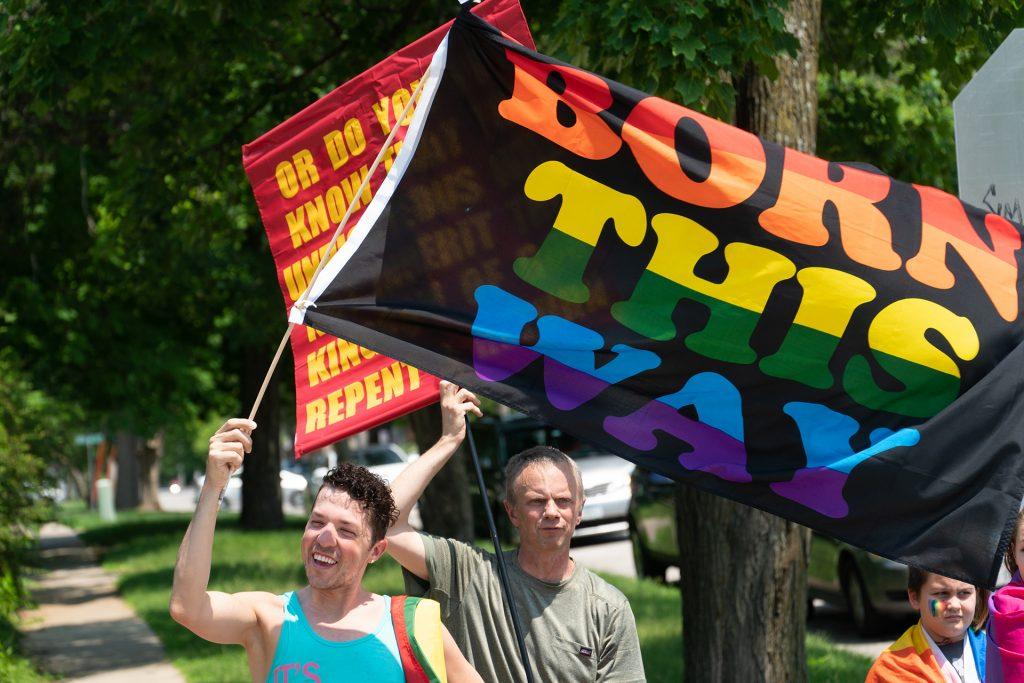Caroline Woods
Several people asked me to write about LGBTQAI community health – also known as pride health. Perfect timing, as I was at the Iowa City’s annual Pride Fest, working the Harm Reduction booth — and let me just say that Pride Fest 2018 was an awesome day.
Everyone at Pride Fest was able to express themselves freely in a welcoming environment. Most people were present and not on their phones (thanks in part to the strong sun), and people of all ages were having a blast with the festivities.
I noticed that there was a “don’t label me” theme behind many of the T-shirts. One T-shirt read, “The Future Is Nongender,” another, “The Future is Non-Binary.” Another one had a multiple choice question on the front that started with “I am…” followed by checkbox options, “A. Lesbian, B. Gay, C. Bisexual, D. Transsexual, E. Human.” “Human” was checked, and the owner of the shirt explained how his brother designed the message to illustrate the need to respect everyone. Other T-shirts included: “Born This Way,” “Unite,” and “Acceptance.” (Side note: my personal favorite was a T-shirt for a baby from the Emma Goldman Clinic that read “Thank you for your cervix.”)
How does this all tie into pride health? Simple. Bias, unconscious or not, and judgment create barriers for individuals. Especially for those who identify as LGBTQAI, trying their best to take care of their physical and mental health needs. Barriers can be eliminated when we give up presumptions and let the other person tell you who they are – this is called practicing cultural humility.
Cultural humility includes showing respect and humbleness to individuals, being deferential, and working to eliminate power imbalances. For example, say you are sitting on an exam table waiting for your annual physical. If a medical provider wears a white coat, stays standing, and peppers you only with yes/no questions, that can be kind of stressful, right? If the medical provider can practice cultural humility by not wearing a white coat, sitting down to talk, asking open-ended questions, and letting you explain, that is a healthier, more holistic approach.
Here is a pride-specific example that embraces the practice of cultural humility: a medical provider sees a person who is cis-female and lesbian with she/her pronouns; the provider creates a caring environment, does not assume that because the client is lesbian that she will not have kids, and the two of them converse about whether or not she plans to have a family in the future.
More and more, cultural humility is being embedded in organizational trainings that usually focus only on cultural competency, or the notion that an individual can interact better with people of different cultures and socio-economic backgrounds by learning generalities about their background. The Consumer Health Foundation is looking at asking systems to move from cultural competency to cultural humility because “cultural humility puts an emphasis on the journey rather than a non-existent endpoint” on learning about others. Basically, it is best that healthcare and other service providers commit to a lifetime of learning about their clients.
Is the practice of cultural humility being implemented in your professional or academic setting? Are you learning more about how each person who identifies as LGBTQAI wants to be treated, or are you just learning general facts and statistics about people who are queer? I encourage you to see how actively practicing cultural humility can help you better support other’s uniqueness. This in turn supports better pride health practices, reduces health inequities, and strengthens the health of your community overall.
Please let me know your thoughts on this article, or if you have suggestions, questions, and comments for future columns! [email protected].











